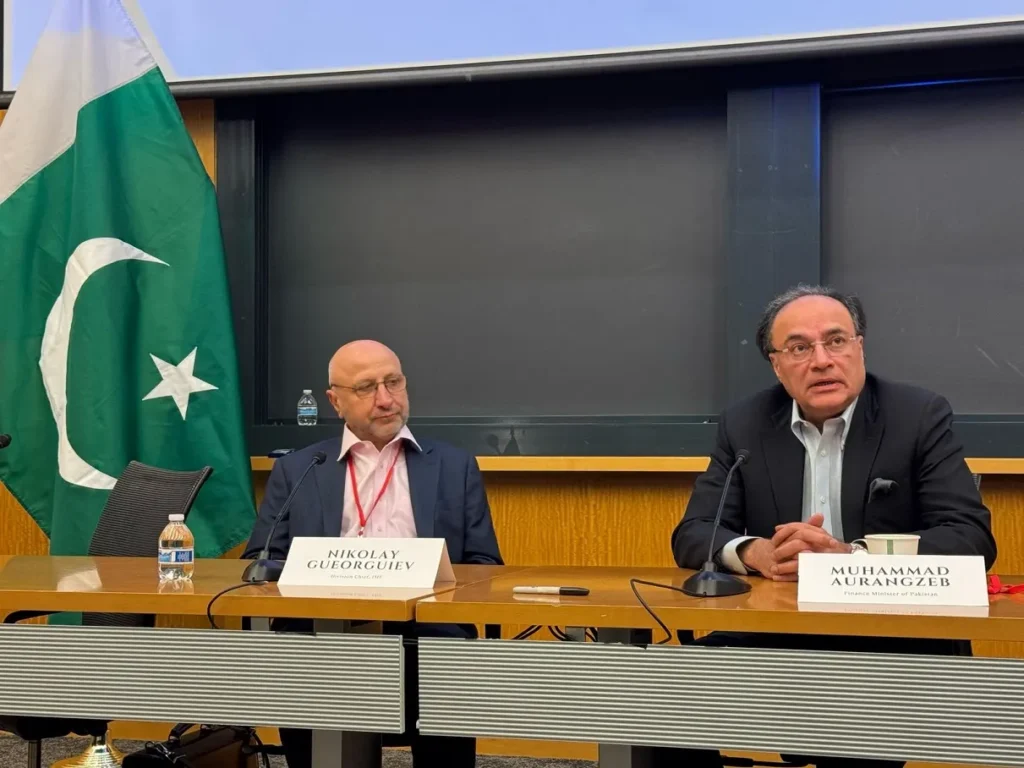Islamabad: Finance Minister Muhammad Aurangzeb on Wednesday expressed confidence regarding the potential reversal of the 29% reciprocal US tariff currently imposed by the United States.
Speaking at a press conference held at the Federation House, he clarified that the real concern in Pakistan’s trade relationship with the US is not the tariff itself but rather the significant imbalance in trade volumes.
According to him, Pakistan’s exports to the United States are valued at approximately $5 billion, while imports from the US stand at just $2.1 billion.
To address this disparity, the government plans to dispatch a high-level delegation to the United States in the near future.
The agenda for this delegation will include proposals to enhance trade in sectors such as soybean, cotton, and other key industries to move toward a more balanced economic partnership.
The finance minister also highlighted some favorable developments on the domestic front, particularly in the energy sector.
He announced that electricity prices have already been reduced and that further decreases are expected to be implemented by July 2025.
In discussing the upcoming federal budget, Aurangzeb made it clear that there will be no exemptions granted to any sector.
He emphasized the importance of a fair tax system and pointed out that salaried employees currently contribute nearly 70% of the country’s income tax revenue.
The upcoming budget, he said, will aim to ease the burden on this segment of the population, reflecting the government’s commitment to equitable taxation.
Aurangzeb also provided an overview of his recent visit to the United States, during which he engaged in over 70 important meetings with global financial institutions and partner nations, including the International Monetary Fund (IMF), the World Bank, as well as representatives from China and Saudi Arabia.
He reported that these discussions reflected a general consensus on the improving macroeconomic indicators of Pakistan’s economy.
On the fiscal front, he shared that Pakistan’s foreign exchange reserves have risen to $14 billion and that the current account is projected to remain in surplus in the near term.
The Monetary Policy Committee, he noted, is scheduled to convene on May 5 to consider a possible reduction in the interest rate, currently seen as high by many within the business community.
He reaffirmed that the 24th loan arrangement with the IMF will be the country’s final program under such terms, indicating a shift towards economic self-reliance.
In terms of key industries, Aurangzeb identified the textile sector as the most vital to the national economy, followed closely by information technology, agriculture, pharmaceuticals, furniture manufacturing, and the automobile sector.
The country’s IT exports currently stand at $3.2 billion, and the government is optimistic about scaling this figure up to $8 billion in the coming years.
Ex-Im Bank Reko Diq
He also spoke about ongoing negotiations with the Export-Import (Exim) Bank and other international financiers to support the Reko Diq mining project, which has the potential to generate annual revenues of up to $2.8 billion.
In addition to focusing on traditional sectors, the finance minister mentioned that the government is laying the groundwork for modern technologies by developing a legal framework for Web 3.0 and blockchain integration.
Commenting on regional geopolitics, Aurangzeb referred to the recent closure of the transit corridor to Central Asia for India, arguing that ongoing conflicts are not in anyone’s interest and such actions could adversely impact India’s access to Central Asian markets through transit trade.
During the session, Acting President of the Federation of Pakistan Chambers of Commerce and Industry (FPCCI), Saqib Fayyaz, raised concerns over the monetary policy, questioning why interest rates had not been lowered further despite evident improvements in economic indicators.
Read More: China Hits US with 34% Tariff War, Tightens Exports
He asked whether the current interest rate level is truly essential to sustain economic stability and manage the balance of payments.
Fayyaz also addressed issues faced by exporters who, after being removed from the fixed tax regime in the previous budget, are now struggling under the standard tax system.
He asserted that the introduction of additional taxes has not only reduced tax compliance but also contributed to the proliferation of fake invoices, ultimately lowering overall tax collection.
FPCCI Response
Nonetheless, the FPCCI acknowledged some positive trends, including a 7.7% growth in exports, which reached $24.6 billion during the first nine months of the fiscal year 2025.
However, this progress was accompanied by a 4.5% increase in the trade deficit. Fayyaz expressed gratitude to overseas Pakistanis, who sent $28 billion in remittances during the same period, helping to cushion the impact of the trade gap.
He advocated for a dedicated support package for the overseas diaspora in the upcoming budget, recognizing their critical role in sustaining the country’s external accounts.
Meanwhile, FPCCI Vice President Asif Sakhi made a call to the Prime Minister and the Federal Board of Revenue (FBR) to commission a forensic audit of the performance of the Faceless Assessment System (FAS) over the last five months.
Also Read: US Markets Crash as Trump’s Tariff Move Triggers 6% Oil Drop
He proposed that the authorities also evaluate revenue trends by closely examining 50% of the green channel clearances processed through the FAS, aiming to enhance transparency and identify potential areas for improvement in the customs and taxation processes.
